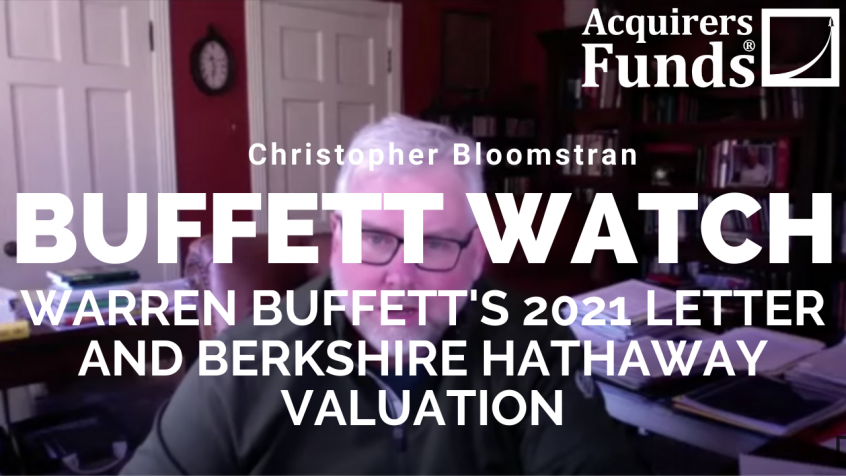In his recent interview with Tobias, Christopher Bloomstran of Semper Augustus discussed $BRK.B’s Share Repurchases . Here’s an excerpt from the interview:
Tobias: There’s a few points in there. One of them is, he spent a little bit of time in this letter defending the conglomerate structure, and he spent a little bit of time discussing buybacks. There are a few articles that I saw afterwards that Buffett defends the buybacks in Berkshire, which I thought was– I didn’t read it that way when I saw it. Then, Elizabeth Warren did a little tour afterwards saying that there was a problem with anonymously buying back shares in the market. Just wondering if you could comment a little bit on perhaps the difficulties of valuing it in a conglomerate structure like that and whether that– I think you spend a little bit more time on Berkshire than Buffett does himself. [laughs] [crosstalk] The function of the buybacks, or what the buybacks achieve?
Chris: When I’m 90, I hope I can write a 15-page letter that the world is willing to read them and there are a lot of people that probably would wish I’d rather write a 15-page letter now, to be honest. I think his criticism of conglomerates is fair. The history of conglomerates is terrible. Capital allocation is terrible, the use of their shares as currency and the promotional aspect, knowing that you’re generally having to overpay for businesses when you’re doing deals as a conglomerator and your need to retain capital and grow, outside of Teledyne and Singleton, there aren’t a lot of great ones. Again, let them be tarred with that. As far as the notion of share repurchases go, we talked about this, I think last time we recorded, and I’ve written about it for years and years. But share repurchases, and he gets into it a little bit in his brief letter this year, are just generally badly done.
They are generally undertaken to offset the dilution that comes on the front end of share issuance with stock options and restricted share units. If we give away 2% of shares per year, and we’re spending 3% of market cap per year to try to shrink the share count by a net one, there’s no price discipline, there’s no sense that price matters. If you’re the CEO, and you’re on the job for five years, you’re going to get rich through the share grants, you’re going to get rich through the options and the RS use. You have every motivation in the world to drive the stock price up in the short term.
Well, the motivation at Berkshire has never been the stock price. The stock has been used as a tool, which is the advantage of a conglomerator doing it correctly. What you don’t have in Berkshire is the dilution on the front end. Find the public business where the leadership– I think it’s to a point, it’s almost silly, the way Mr. Buffett and Mr. Munger are paid. They’ve always made a point that, “Look, we own the thing, and we’re going to get rich by not taking a salary and a cut.” That’s been their fashionable thing to do. You don’t have the gross distortion that nearly every other public company has. You don’t have the delusion, you don’t have the short-term motivation. Thank God, Elizabeth Warren is not treasury secretary or has never been at the Fed.
I think the abuses that take place on share repurchases, have merit, and have a lot of merit. If you look at the broad market for the last 20 years, and you look at the percentage of profits, after dividends are paid, which represent now 40%, 45% of overall corporate profit. You being the market have spent more than the balance of net income buying back shares, and for the last decade, we’ve been buying back shares at north of 20 earnings at 5% or less earnings yields, they may be nominally driving down the share count, but not to the degree to which profits are going out the door. Companies that abuse the repurchases on that front are diverting the capital allocation process to buying back shares at expensive prices, a lot of cases would be north of intrinsic value, and that’s destroying shareholder value. Not the case for Berkshire.
Tobias: Without restricting share buybacks, how do you correct for that?
Chris: I don’t think you will. I don’t think the way our society is constructed that we’re going to motivate management’s broadly speaking properly. I think having skin in the game, which is really the motivation of why you would give share grants, has a lot of merit, but if I was God, and sitting on a lot of boards of directors’ comp committees, I would try to tie a lot more of the hurdle rates, and the required holding periods of the shares to a much longer period of time. You’d never do it, but why not? If you know the CEO is going to be there for an average of four and a half years, why not say, “Sure, we’ll give you a bunch of share grants.” We know your capital allocation decisions may not bear fruit for five or 10 or 15 years, why not make the vesting schedules extend beyond the duration of employment? Would never happen. You just get this asynchronous time horizon, in terms of corporate behavior. I don’t know how you change it. Oddly, it takes a recession or a pandemic to shrink share repurchases.
You have the Great Recession, and nobody bought a share back, stocks were down two-thirds. The banks and various other industries were forced to raise capital because they were in trouble. The very moment that the stock price is cheap, you can’t buy them back. You’re terrified, you need liquidity. It’s just all done in reverse. Berkshire is a very big position of ours, I think I’ve got a bunch of companies in the portfolio, they’re going to do better. The way of Berkshire as a conglomerate utilizes the share, as one of the capital allocation tools has been brilliant, and it’s extremely conservatively done and it’s rarely copied, which I think gives Berkshire an enormous advantage surely over the history of conglomerates, but most public companies, which tend to do it badly.
Tobias: It’s a muddied conversation about share buybacks because when you look at them in aggregate, they do seem to– the greatest number of shares are always bought back at the very peak of the market. There are no shares bought back at the bottom of the market, when sensibly you’d want it to be the other way around. Part of the difficulty is that they all earn most of their profits at the top of their market and at the bottom of the markets like we saw in 2009 because the banks have lost so much money. S&P 500 earnings were not meaningful for that year. They just didn’t have the liquidity to go and do it in many instances. It doesn’t surprise me that the argument’s ongoing that the argument seems to revive once a year. It’s incredibly frustrating because I agree with many of those arguments that the buybacks aren’t done in the right way, but it’s also true that if they’re done in the right way, they’re incredibly powerful.
Chris: Oh, they are materially powerful. You look at the buybacks, $25 billion for the year in the last couple quarters at a rate of $9 billion quarter, spending more than the operating earnings of the business, buying shares back, and buying them back at– you do the math on the average price at which all the shares were retired in 2020, and you’re paying 105% of book value on a company that’s doing 10 return on equity. It’s incredible in a world of zero interest rates.
I’ve got a table in my letter which I’ve always broadcast out this 10 ROE, and growth and market value and various multiples to earnings at which you’d expect to see the market cap of the business a decade hence and that always assumed no share buybacks because you had 33 years where they didn’t buy a share back and they use the capital and the Gen Re deal they use some of the stock to buy the railroad, but they’ve really not been using the stock. For the last decade, the share count was just flat.
They bought a little bit back two years ago, and then $5 billion the prior year, then the $25 billion this past year. But they’re big numbers. If Berkshire’s running operating earnings of mid 20s, to high $20 billions, and if they’re going to be buying back at that $3 billion a month rate, you’re looking at $36 billion on an annualized basis, which is way more than the operating earnings of the business.
I get to $40 plus billion in total Berkshire profitability, but some of that’s not cash capital, that comes to Berkshire. $10 billion of my number is the retained earnings of the stock market investees. You have the dividends coming in a little bit, interest anymore coming in. One aspect of the letter that Mr. Buffett really delved into, and it was discussed at last year’s meeting, and I’ve been writing about for the last six years is, the capital that’s being spent at the railroad and at the energy operations are sizably in excess of depreciation.
You can find out more about Tobias’ podcast here – The Acquirers Podcast. You can also listen to the podcast on your favorite podcast platforms here:
For all the latest news and podcasts, join our free newsletter here.
Don’t forget to check out our FREE Large Cap 1000 – Stock Screener, here at The Acquirer’s Multiple:




